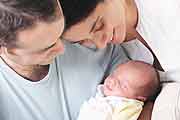
THURSDAY, Oct. 17 (HealthDay News) — The use of donor eggs — whether from family, friends or strangers — by infertile patients undergoing in vitro fertilization (IVF) has risen in the last decade, and results have been favorable, with an increasing number of healthy babies born at term.
Researchers evaluated data from the majority of U.S. fertility centers from 2000 to 2010, tracking the number of good outcomes — defined for the study as healthy single live births of infants delivered at term (37 weeks or later) and weighing 5.5 pounds or more.
“The chance of delivering an infant at term weighing more than 5.5 pounds is becoming more and more common with donor eggs,” said study author Dr. Jennifer Kawwass, a reproductive endocrinologist and infertility fellow at Emory University School of Medicine and guest researcher at the U.S. Centers for Disease Control and Prevention.
Good birth outcomes increased from 18.5 percent to more than 24 percent during the decade, the study found.
The number of donor egg cycles annually increased from nearly 11,000 in 2000 to more than 18,000 in 2010. The proportion of patients using frozen instead of fresh embryos rose from about 27 percent to more than 40 percent.
Couples electing to have a single embryo transferred rose from less than 1 percent to more than 14 percent, the researchers noted. Multiple transfers increase the chances of having twins or other multiples, which in itself raises the risk of health problems for each baby.
The study is published online Oct. 17 in the Journal of the American Medical Association to coincide with the release of the research at the joint annual meeting of the American Society for Reproductive Medicine and the International Federation of Fertility Societies, held in Boston.
Egg donors can be anonymous or can be family or friends, Kawwass said. If the donors are compensated, the average fee is about $6,000, she noted. Donors must first pass psychological and medical testing. Then, over about two to four weeks, donors receive IVF ovarian stimulation to produce eggs, and then undergo egg retrieval.
In the study, Kawwass also found that the average age of donors (28) and recipients (41) didn’t change over time. Recipient age did not affect birth outcomes.
The study looked at data from 443 clinics, representing 93 percent of all U.S. fertility centers. The data came from the CDC’s National Assisted Reproductive Technology Surveillance System. Fertility centers are required to report in.
Kawwass said it is difficult to compare the success rate of patients using donor eggs (24 percent) to that of women not using donor eggs, because IVF outcomes are categorized by maternal age. However, previous research by her group found that about 42 percent of cycles not using donor eggs in 2008 resulted in a good outcome. But the group includes women of all ages, she said.
In the new research Kawwass also found some downside. Women with certain causes of infertility — uterine or tubal factors — were less likely to give birth to a healthy baby, and so were black women. She can’t explain ethnic/racial differences in results.
Dr. Evan Myers, a professor of obstetrics and gynecology at Duke University School of Medicine, in Durham, N.C., wrote a journal editorial to accompany the study.
“This study confirms that donor eggs have a high success rate,” Myers said. “In some ways it confirms what we already knew. The older you are, the harder it is to get pregnant.”
The take-away message for women in IVF treatment, he said, is this: “If the chances of success with their own embryos are low, and if they are willing to consider donor eggs, the likelihood is good they will have a healthy baby.”
Among other research that needs to be done, Myers said, is the effect of ovarian stimulation on donors. Not enough is known about the effects of donating, he said, especially in women who do it often and long term.
More information
To learn more about infertility, see the American Society for Reproductive Medicine.
Copyright © 2026 HealthDay. All rights reserved.

